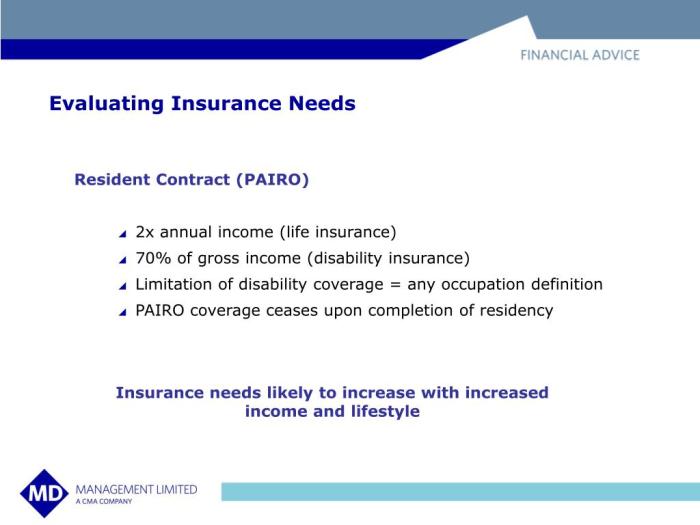Diving into the world of insurance can be a daunting task, especially when it comes to evaluating your specific needs. From personal insurance to health, property, and liability coverage, understanding what you require is crucial for financial security. Let’s break down the essentials of evaluating insurance needs and how it impacts your overall protection.
Assessing Personal Insurance Needs
When it comes to personal insurance needs, it’s essential to consider the various types of coverage required to protect yourself and your loved ones. Factors such as life events and individual circumstances play a significant role in determining the amount of insurance coverage needed.
Types of Insurance Coverage
- Health Insurance: Covers medical expenses and treatments.
- Life Insurance: Provides financial protection for your family in case of your death.
- Auto Insurance: Protects against damages and liabilities related to your vehicle.
- Homeowners/Renters Insurance: Safeguards your property and belongings from unforeseen events.
Factors Influencing Insurance Coverage
- Income Level: Higher income may require more coverage to maintain the same standard of living.
- Number of Dependents: More dependents may necessitate additional coverage to support them financially.
- Debt Obligations: Higher debts may require increased coverage to settle outstanding balances.
Impact of Life Events on Insurance Needs
- Marriage: Combining finances may lead to the need for joint policies or increased coverage.
- Children: Additional dependents may require more comprehensive insurance to secure their future.
- Buying a Home: Owning property may necessitate homeowners insurance to protect your investment.
Evaluating Health Insurance Needs
Health insurance is a crucial aspect of financial planning as it helps individuals cover medical expenses and minimize out-of-pocket costs. Understanding the coverage options available is essential in selecting the right health insurance plan that meets individual needs and preferences.
Types of Health Insurance Plans
There are several types of health insurance plans available, each with its own set of features and benefits. Some common options include:
- Health Maintenance Organization (HMO): HMO plans typically require individuals to choose a primary care physician and get referrals to see specialists. They often have lower out-of-pocket costs but limited provider networks.
- Preferred Provider Organization (PPO): PPO plans offer more flexibility in choosing healthcare providers and do not require referrals to see specialists. While they have higher premiums and out-of-pocket costs, they provide coverage for out-of-network care.
- High-Deductible Health Plan (HDHP): HDHPs come with lower premiums but higher deductibles. They are often paired with Health Savings Accounts (HSAs) to help individuals save for medical expenses tax-free.
When evaluating health insurance needs, individuals should consider factors such as their overall health, anticipated medical expenses, preferred healthcare providers, and budget constraints. Choosing the right plan requires a balance between monthly premiums, out-of-pocket costs, coverage limits, and provider networks to ensure adequate healthcare coverage without breaking the bank.
Understanding Property Insurance Requirements

When it comes to protecting your property, having the right insurance coverage is essential. Property insurance comes in various types, each designed to cater to different needs and situations. Let’s delve into the types of property insurance, factors that influence your insurance needs, and coverage options available to safeguard your property.
Types of Property Insurance
- Homeowners Insurance: This type of insurance is tailored for homeowners and provides coverage for both the structure of the home and personal belongings inside.
- Renters Insurance: Renters insurance is designed for tenants renting a property and covers personal belongings against theft, fire, or other covered perils.
- Condominium Insurance: Condo insurance is specifically crafted for condo owners, offering coverage for personal property and liability within the condo unit.
Factors Influencing Property Insurance Needs
Property insurance needs can vary based on several factors such as:
- Location: Properties located in high-risk areas prone to natural disasters may require additional coverage.
- Property Value: The value of your property will determine the coverage limits needed to adequately protect it.
- Personal Belongings: The value of your personal belongings will influence the amount of coverage required to replace them in case of damage or theft.
Coverage Options for Protecting Property
There are various coverage options available to protect your property against risks like theft, fire, or natural disasters. Some examples include:
- Fire Insurance: Provides coverage for damages caused by fire to your property and personal belongings.
- Theft Insurance: Covers losses resulting from theft or burglary of your belongings.
- Natural Disaster Insurance: Offers protection against damages caused by natural disasters such as hurricanes, earthquakes, or floods.
Assessing Liability Insurance Needs
Liability insurance is crucial for protecting individuals and businesses from financial losses due to lawsuits or claims. It provides coverage in situations where the insured party is held responsible for damages to others.
Types of Liability Coverage
There are several types of liability coverage that individuals and businesses can consider:
- Auto Liability: Provides coverage for bodily injury and property damage caused by an insured vehicle.
- Umbrella Policies: Offer additional liability coverage beyond the limits of basic policies, providing extra protection.
- Professional Liability Insurance: Also known as errors and omissions insurance, it protects professionals from claims of negligence or inadequate work.
Scenarios Requiring Liability Insurance
Liability insurance is crucial in scenarios such as:
- Car Accidents: Auto liability insurance can cover medical expenses and property damage if you are at fault in an accident.
- Business Operations: Professional liability insurance protects businesses from lawsuits related to professional services or advice.
- Homeownership: Liability coverage in homeowners insurance can protect you if someone is injured on your property.
Determining Coverage Limits
It is essential to assess your liability exposure and financial assets to determine appropriate coverage limits. Factors such as income, net worth, and potential risks should be considered to ensure adequate protection.
